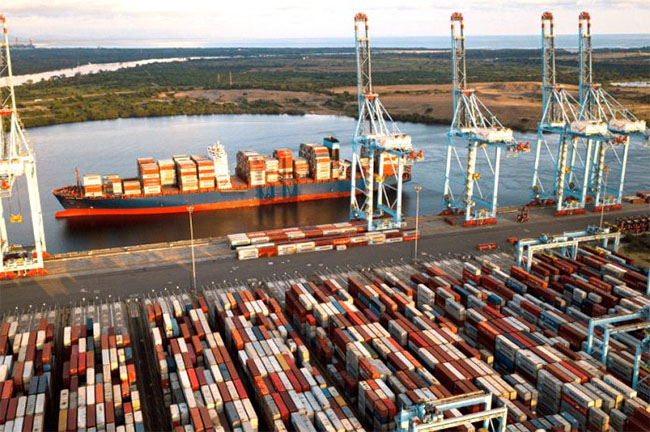by Mexico News Daily
Replacing just one-tenth of Chinese imports with products made in North America would significantly boost economic growth in Mexico and the United States, Finance Minister Rogelio Ramírez de la O said Wednesday.
Ramírez, who will continue as finance minister after President-elect Claudia Sheinbaum takes office on Oct. 1, also said that more than half a million new jobs would be created in Mexico if North America replaced 10 percent of Chinese imports with local production.
He told President Andrés Manuel López Obrador’s morning press conference that GDP growth in Mexico would increase by 1.4 percentage points over current or recent levels if North American production ramped up to a point where 10 percent of Chinese imports were able to be replaced.
Economic growth in the United States and Canada would increase by 0.8 percentage points and 0.2 percentage points, respectively, Ramírez said.
There would be “very significant impacts for the three countries,” he said, noting that both the manufacture of additional products in North America and their sale to local consumers would spur growth.
The finance minister also said that increased local production would create 560,000 jobs in Mexico, 600,000 in the United States and 150,000 in Canada.
The GDP growth and job creation figures he cited presumably came from government modeling. Ramírez didn’t say how soon he believed North American production could replace 10% of Chinese imports.
In which sectors will Mexico seek to boost production?
López Obrador told reporters that the federal government “already has a list of what we import the most from China and what can be produced in Mexico and North America.”
Ramírez said that “the products we’ve looked at are all in the manufacturing chain.”
Among them, he said, are medical devices, pharmaceutical products, electronics, metal products, auto parts and electrical and non-electrical machinery.
López Obrador said that the government’s plan to increase production in Mexico and North America had been presented to United States authorities. He claimed that the U.S. government “pirated” the plan and “began to call it … nearshoring.”
“But that [plan] emerged here, from our country,” he said.
Paradoxically, the establishment in Mexico of manufacturing plants operated by Chinese companies could help Mexico, and North America, reduce its reliance on Chinese imports.
Chinese companies already operate in various sectors in Mexico, and many others, including Lingong Machinery Group and electric vehicle manufacturer BYD, have announced plans to open plants here.
AMLO highlights importance of North American self-sufficiency
Before Ramírez outlined the benefits that increased production capacity would generate for the Mexican economy, López Obrador declared that during his six-year term in office, the United States government and the U.S. business sector came to understand “the importance of being self-sufficient in North America” and “not depending on other continents, other regions of the world.”
“[We need to] produce in North America what we consume, … strengthen America as a continent, starting with what has already begun — the consolidation of North American economic integration. That is going very well,” he said.
The fact that Mexico has become the United States top trade partner — and the largest exporter to the U.S. after dethroning China in 2023 — shows just how much the country has advanced, López Obrador said.
“However — and this is what Rogelio is setting out — we’re still depending a lot on imports from China, that can be reduced. We’re not talking about eliminating them completely because that wouldn’t be viable, not even in the medium term,” he said.
Ramírez said July 20 that Mexico needs to review its trade relationship with China because it isn’t “reciprocal” given that that Mexico’s imports from China — including significant quantities of consumer goods — far exceed its exports to the East Asian nation.
“We buy US $119 billion [worth of products] per year from China and we sell $11 billion [worth of goods] to China. China sells to us but doesn’t buy from us and that’s not reciprocal trade,” he said during a speech at an event in San Luis Potosí.
Mexico recently implemented new tariffs on a broad range of Chinese products, but a former Mexican ambassador to China told Mexico News Daily that he didn’t believe they would be a sufficient deterrent.
The incoming government needs to do more to “help Mexican industry withstand this tsunami of Chinese imports,” Jorge Guajardo said.
In his address in San Luis Potosí, Ramírez suggested that stronger measures against Chinese imports may be coming.
The finance minister also said that Mexico has “great opportunities to produce more” and by doing so will “maintain our industry, our jobs and our salaries.”
By Mexico News Daily chief staff writer Peter Davies (peter.davies@mexiconewsdaily.com)



